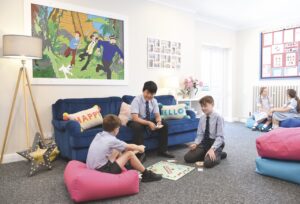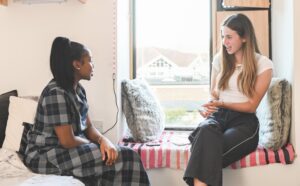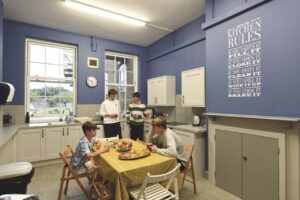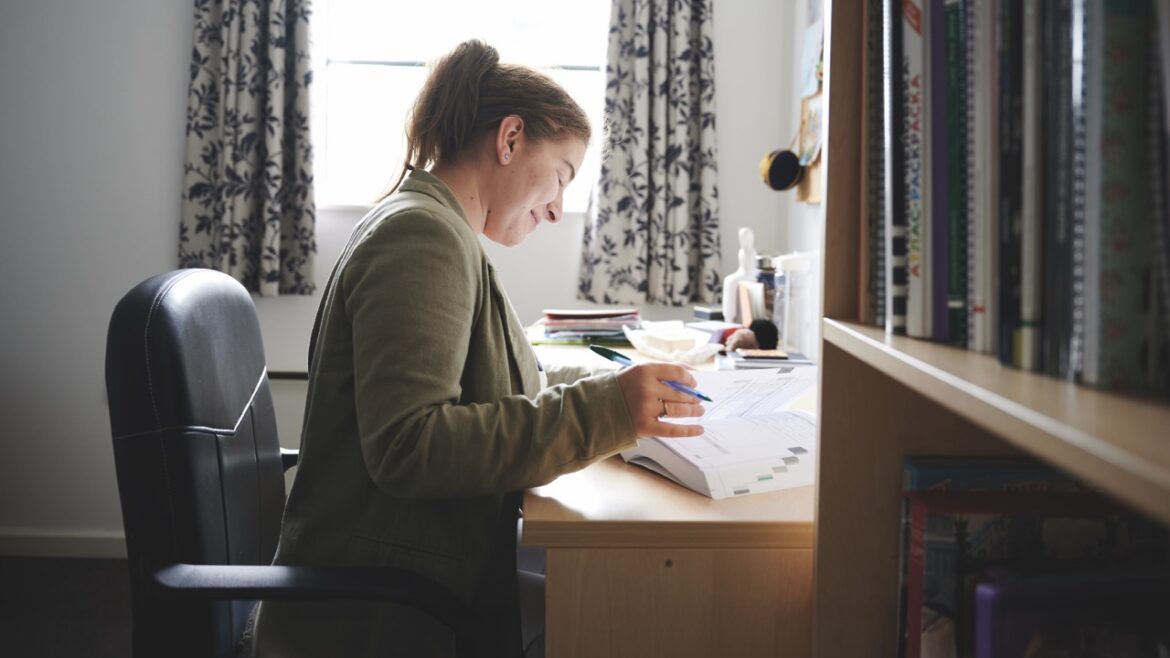Modern boarding allows pupils greater freedom to make their own decisions. Charlotte Phillips speaks to the experts about what’s involved
Words by Charlotte Phillips
Think ‘boarding school’ and the imagery that springs to mind – from the haunted corridors of Hogwarts to the midnight feasts at Malory Towers – is relentlessly traditional. It’s not a total misconception. While Whomping Willows and ginger beer are in short supply, the positive qualities that come with the boarding experience today – such as forging lifelong friendships and learning how to live as a community – would be familiar to previous generations of boarders.
What has changed, however, is the way that boarding is organised. Today, the approach puts the child firmly at the heart of the process. Prospective boarders don’t just get a say in where and when they board, but whether they board at all – so their input is vital.
There are other considerations too. In Cambridgeshire, boarding comes in a dazzling range of options: board full-time or a couple of nights a week? Is a school in peaceful rural surroundings the optimal backdrop for a spot of last-minute exam revision, or is it outweighed by a city-centre location where every amenity lies within easy reach? As with much else in education, there’s never really an answer where one size fits all.
Growing independence
At Stephen Perse Cambridge, boarding is offered in the sixth form only – so pupils are that bit older and more independent. Their boarding accommodation is a short walk from the school campus, creating a clear demarcation between school and ‘home’. While the school offers a range of activities, students often enjoy doing their own thing.

Students bond with games at Gresham’s
“We have activities at the weekend; but you don’t have to participate if you don’t want to,” says Denise Hammersley, head of boarding. “Our boarders love the option of walking into Cambridge with their friends.”
Kimbolton School provides an equally unique boarding experience, but in a completely different way. Boasting a castle and acres of parkland, it provides an ambience that’s an antidote to the high-rise living experienced by some city-dwelling pupils. “Our pupils learn to love it very quickly,” says Dr Daniel Koch, senior deputy head. “Even if nature and the countryside aren’t your thing when you get here, they will be when you leave.”
Then, there’s the accommodation. Some boarders thrive on the camaraderie of a shared room, while others require a haven where they can be on their own. At Stephen Perse Cambridge and Abbey College Cambridge, single en-suite rooms come as standard. “Students can have total privacy if they want,” says Dr Ellen Hesse, principal at Abbey College. “We have some neurodivergent pupils who need their own rooms to have peace and quiet to get organised.” It’s also a boon for sixth formers – many newly arrived from other countries. “They have to get used to speaking English and a totally different learning style, which is exhausting for them. Having a single room makes the transition a bit easier,” she adds.
Flexible boarding

Bishop’s Stortford College allows students to decorate rooms
Full boarding is more popular in the top school years and the obvious choice for international pupils. Some schools take a near 24/7 approach: open every weekend and, in the case of Abbey College, during half-term and Easter too. While pupils are welcome to stay elsewhere, many stay put. For younger pupils, the priorities can be slightly different, with parents looking for greater supervision. For example, after-school timetabled homework sessions, or a mobile phone policy that enables pupils to phone home whenever they require.
A school with à la carte boarding options – starting with just a couple of nights a week and then moving to weekly or full boarding – can be hugely appealing. “Some of our parents who are stationed or living abroad will go for the full-termly option,” says Kimbolton’s Dr Daniel Koch. “Many choose the weekly option, meaning the children board Monday to Friday. We also have a flexi-boarding structure, where children can board on Monday and Tuesday evenings, often because that’s when parents are working late, and then stay home on other evenings of the week.”
Transition tactics
Schools put a great deal of effort into welcoming new boarders, ensuring that by the time their first term starts, they already feel like part of the school. For instance, new pupils at Gresham’s visit for a morning in the summer term before they start with their parents. Team-building games, a tour of the boarding house and meeting senior pupils will give them a sense of belonging. “Anyone would be concerned about how their child copes with that adjustment,” says Chris Cox, head of boarding. “The fact they have been here, met the matron, myself and a couple of pupils from their house will hopefully allay some of those fears.” Gresham’s sixth formers also write to all the new pupils at the end of the summer term to introduce themselves and offer tips about coping when they first start.

Gresham’s makes new boarders feel welcome
Stephen Perse’s three-day induction for new boarders focuses on familiarising them with the school, Cambridge and each other. “Induction gives all those opportunities to settle in – we’ve never had any homesick children,” says Denise Hammersley. “They are new to the school, but going with the friends they have already made in boarding helps them enormously.”
Some practical preparation is strongly recommended too. “Make sure the children organise themselves for the next day so it’s not mum or dad packing their school bag,” says Dr Ellen Hesse. Mastering the complexities of alarm clocks and washing machines won’t go amiss either.
Home from home
Making a homely atmosphere can ease the process. “When I show prospective families around the boarding house, there are many comments about how homely it is,” says Claire Elliott, head of boarding at St Mary’s. “We try to furnish the common rooms as we might a home, with soft furnishings, rugs, lamps, pictures and fairy lights – it’s definitely not an austere environment. It’s a place where the girls can gather, watch a movie, play board games – dance games on the Nintendo Switch are popular – everything they might do with their siblings at home. From around year 9, pupils can use the kitchen at weekends – international pupils will often prepare recipes they enjoy from home.”

With a good range of social activities, Abbey College makes boarders feel at home and part of a bigger community
While the school provides bedding, most of the girls prefer to bring duvet covers, blankets and throws from home. “The girls can also decorate their bedrooms with photos of family, friends and even the odd horse, or with posters of celebrities and famous bands,” says Claire. “Some bring a teddy, jewellery and put fairy lights around their bed. It makes it really cosy.”
With around 200 boarders split across four boarding houses (two boys and two girls), Bishop’s Stortford College offers an inclusive, vibrant and welcoming boarding community. “Prior to arrival, new full and weekly boarders are invited to meet with their house parent and ‘buddies’ are set up with current pupils,” explains Joanna Rockel, head of marketing at Bishop’s Stortford College. “With a special house gift to spark a sense of instant belonging, our three-day induction combines a fun orientation programme that helps students get to know their house, the college and the local town. They explore together with their house parents, grabbing ice cream along the way so everyone knows where they can find all the essentials.
“Regular house socials, movie nights, cultural meals and celebrations, as well as an action-packed weekend activity programme ensure that boarders get a chance to meet and socialise with others. The College quickly becomes home away from home.”
Letting go
There comes a point when parents need to let go and trust the school to do its job. “They need to give the child the space to breathe and enjoy boarding life, taking advantage of everything on offer,” says Chris at Gresham’s. “If parents take a step back and relinquish some control, they’ll get more out of seeing their child develop.”

Bishop’s Stortford College encourages students to form close friendships
Boarders’ day-to-day pastoral care begins in their boarding house, led by the house parents and supported by an experienced team. Their role focuses on understanding each child, offering support when needed and encouraging them to spread their wings and fly. The gains can be immense; as students get to know each other, strong bonds develop.
“Building that small community is a huge thing,” says Stephen Perse’s Denise. “Students feel like they are living with their family.” It’s a gentle introduction to independence where students start to look after themselves but are never alone. “They know where I am, so if there’s a problem during the day they can come and see me.”
One of the most important skills boarders learn is how to manage their own behaviour and emotions. “It’s about how to navigate relationships, learn how to cope with that rich tapestry of human life on your own,” concludes Chris. “Boarders are much more willing to tackle their issues themselves. This is something that takes an additional layer of confidence that perhaps sets them apart.”

